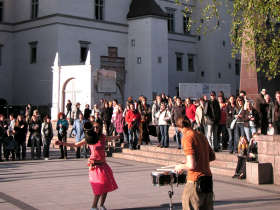City Concert, Europe Festival, Baltic Way, May 21, 2007

Street Music Day was the premiere event in Vilnius 2009’s Aperitif series, which will continue on June 22, 2007 with a Night of European Culture.
A Friday Noon parade featuring traditional brass band music kicked off the Europe Festival entitled “Lithuania – A Starlet of Europe” and staged to mark both the third anniversary of Lithuania’s admission to the EU (May 1) as well as Europe Day (May 9). About 70,000 visitors over the course of three days enjoyed European cultural and culinary delights, and also partook of traditional arts and crafts proffered on stages and in tents arrayed along Gedimino prospektas. Non-EU Europe was also represented in the form of Swiss modern dance performances and Turkish shish kebab. Restaurants around town served up Greek, Spanish, Czech and Bulgarian cuisine and beverages as well.
The three-day festival wound up with a concert in honour of motherhood, an event organized and supported by the City of Vilnius, the national government and the Foreign Ministry. Mother’s Day celebrations were banned during the Soviet occupation, but Lithuanians revived their prewar tradition once they regained independence in 1990; since then, they’ve been honouring mothers on the first Sunday in May. It’s also common to pay respects to deceased mothers and grandmothers by visiting their graves on that day.
Two days after this festive weekend, more than 2,000 Lithuanians gathered on Vilnius’ Cathedral Square (Katedros aikštė)on May 8th and formed a human chain to express their solidarity with Estonia, where clashes amidst demonstrations triggered by the transfer of a Soviet soldiers’ memorial to a different location in Tallinn in late April claimed one life. Meanwhile, many people also formed human chains on the Latvian-Lithuanian and Latvian-Estonian borders as well as in the Latvian capital, Riga. These human chains evoked memories of the Baltic Way of August 23, 1989 when Lithuanians, Latvians and Estonians joined together 50 years after the signing of the Molotov-Ribbentrop Pact to form a 600-kilometer-long, hand-in-hand human chain extending from Vilnius to Tallinn.
By the way: With the election of 67-year-old Juozas Imbrasas on April 16, Vilnius now has a new mayor. Artūras Zuokas’ successor has been involved in municipal government for 10 years—he was deputy mayor twice and even served a brief term as mayor once before (June 1999-April 2000). His political career has included two changes of party affiliation: after a switch from the conservative Homeland Union to the Liberal Union, he’s been a member of Order and Justice since 2002 and is currently that liberal democratic party’s deputy chairman. Juozas Imbrasas speaks Lithuanian, Russian, Polish and English. In a May 2nd communiqué, Mayor Imbrasas invited his Linz counterpart, Dr. Franz Dobusch, to pay an official visit to Vilnius.
Translation commissioned by Linz09








